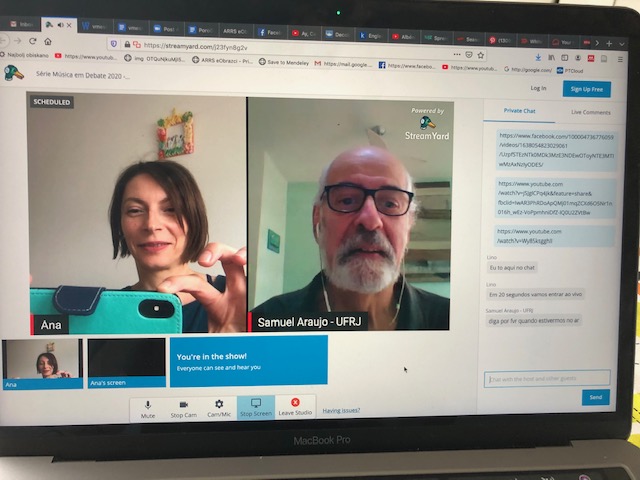The online discussion was hosted by Samuel Araujo and several ethnomusicological organizations in Brazil (Ethnomusicology Laboratory and Musiculture Group – Tide, UFRJ, UFPA Ethnomusicology Laboratory composed of the Studies Group on Music in Pará, Research Group on Music and Identity in the Amazon, both from UFPA, and the Studies Group of Music in the Amazon, from UEPA).
Catherine Baker: The space of an embrace: Eurovision’s affective communities in lockdown
Shortly after lockdown in Italy began, Italian apartment-dwellers started joining in co-ordinated singing from their balconies, including the song that had just won the Sanremo Music Festival and was still officially Italy’s entry for the 2020 Eurovision Song Contest. When it became clear that that too would have to be cancelled, Eurovision fans rallied together on social media to bind their sense of community back together by watching past contents online. Continue reading “Catherine Baker: The space of an embrace: Eurovision’s affective communities in lockdown”
Martin Pogačar: Futures of a clandestine recording: a song as a mnemotechnical device
A couple of years ago I was browsing YouTube videos when a video popped of a 1941 recording of an old Slovenian choir song Lipa zelenela je (“The linden tree grows green”). I knew the song only too well. It was a ubiquitous sonic feature of my growing up in the socialist Slovenia/Yugoslavia, part of choir repertoires, and a popular funeral song (as it is today). Hence it was generally disliked at the time by myself and my peers, and also became a matter of pop musical reinterpretations. Lačni Franz, for example, took the title and ironicised the funeral motive in his reinterpretation of the song. However, I hardly knew anything about the 1941 recording that, found on YT about 75 years later, shows two images, one of a map of occupied Slovenia during the Second World War (1941–1945) and another of Ljubljana under fascist occupation (1941–1943).
Lipa zelenela je. 1941 performance. Source.
Rajko Muršič: Everyday communism in Slovenian grassroots and underground music venues
We live in deeply paradoxical times. Everybody has access to more music than ever, but at the same time music is becoming less and less powerful as a social activity. Music – especially popular music – does still affect society, but not the way it did decades ago. All around the western world, music venues are rapidly disappearing or barely surviving at the margins. Pocket loudspeakers occasionally disturb social “peace”, but earphones seem to inscribe definite symbolic boundaries in everyday reality, at home and in public.
Still, music’s basic appeal has not changed, with it being the most effective symbolic practice that catches both the whole body and the mind. It is essentially intimate, social and common at the same time. Live music will not disappear so easily.
In this short post I will present some thoughts related to continuous encounters with various music venues in Slovenia in several capacities – as part of the audience, as an active participant in the establishment and short-term operation of such a venue, as a musician, and, finally, as a researcher. In the 1990s I studied the Rock and Youth Club in the Slovenian village of Trate, which eventually became a dissertation-based monograph.
Evrim Hikmet Öğüt: Music and Musicians “in the Days of Corona” – creating a new hope or deepening inequalities?
Music and Musicians “in the Days of Corona” – creating a new hope or deepening inequalities?
Coronavirus (COVID-19) pandemic not only determines our agenda but also surrounds us all. What we do and what we cannot, everything is related to it. We live through the pandemic and speak its language. Our way of seeing the present world, our ways of understanding the past and envisioning the future are all under transformation. This epistemological shift, most probably, will become more distinctive in the following days and we will discuss it a lot. My intention here is to think about how our relationship with music gets and can get its share of this transformation.
Keywords: Corona pandemic, precarity, solidarity
Ana Hofman, A response column, SEM student news
Read!
Ana Hofman: Dear SEM : a response column … with Dr. Ana Hofman … SEM student news. fall/winter 2020, vol. 15, no. 2, str. 4-6. ISSN 2578-4242.
SIEF Working Group BASE: Bodies, Affects, Senses and Emotions 3rd workshop in Ljubljana, Slovenia, 4 and 5 June 2020
The 3rd BASE workshop seeks to explore the work which is currently being done by working group members and other researchers whose work focuses on the body, affects, senses and emotions.
We invite 20-minute presentations from scholars across the arts & humanities concerned with the focus of the working group – bodies, affects, emotions, senses – but taking a variety of perspectives (historical, synchronic etc). We especially welcome presentations that focus on “collective becomings” – affective politics in the time of global uprisings.
Proposals of no more than 300 words, accompanied by a max 100-word biography, should be submitted to Ana Hofman ahofman@zrc-sazu.si and to basewg@siefhome.org by Monday, 3 February 2020.
Workshop Convenor: Dr. Ana Hofman, Institute of Culture and Memory Studies, Research Centre of Slovenian Academy of Sciences and Arts
Venue: Research Centre of the Slovenian Academy of Sciences and Arts
Local organising team: Dr. Ana Hofman, Dr. Martin Pogačar, Teja Komel Klepec (Institute of Culture and Memory Studies, Research Centre of Slovenian Academy of Sciences and Arts)
“Affection of Sounds and Politics in South-Eastern Europe: Challenges and Perspectives” panel at 2020 EASA conference
The panel will touch affection of sounds and politics in SE Europe in the widest anthropologically relevant aspects: from sound studies to anthropology of music and dance. It will especially theorize cross-sections of art and politics, work and leisure, affect and defiance, past and the present.
https://easaonline.org/conferences/easa2020/panels#8758
Ana Hofman on decoloniality and ethnomusicology
Ana Hofman v debati o dekolonialnosti in etnomuzikologiji z: Naila Ceribašić, Institute of Ethnology and Folklore Research, Zagreb; Regina F. Bendix, Institute for Cultural Anthropology/European Ethnology, Göttingen, Germany; Olga Pashina, State Institute for Art Studies, Moscow, Russia; Timothy Rice, Department of Ethnomusicology, University of California, Los Angeles, USA; Jonathan P. J. Stock, Department of Music, University College Cork, Ireland
Entire article available here.
Ana Hofman – SINGing, SOCIALizing, SELForganizing: An insight into an engaged Viennese music collective
It is the evening of 11 December in Vienna’s 15th district, and I am sitting with Jana, Lejla, and Šarlot, eagerly awaiting the screening of a documentary about a unique community choir on the occasion of its fourth anniversary. We are in Brunnengasse, known as a migrant district of Vienna, at the AU Gallery, which is starting to crowd with men, women, and children of all ages and various ethnicities, all of them warmly greeting each other. In this setting, through the documentary and a public rehearsal that soon began, I became acquainted with a most interesting Viennese singing collective, the 29th of NovemberChoir. Vienna is a city known for its music, and one can expect many different musical networks, organizations, and professional bodies. And yet the choir members, many of whom I met at the documentary screening, do not perceive themselves as musicians at all. Rather, they claim radical amateurism, musical self-education, and self-organization. Why?
More information available here.



